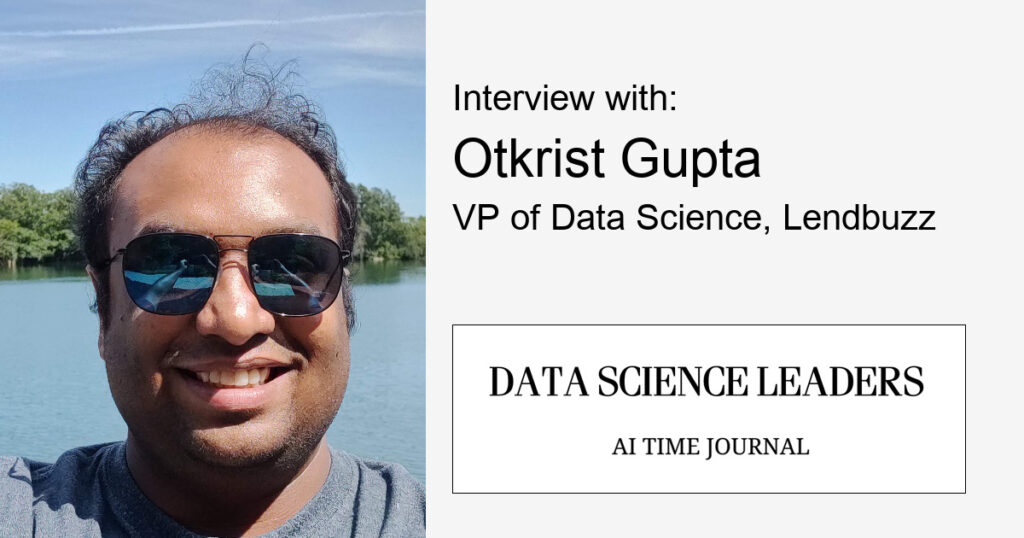
A famous quote from Robert A Heinlein reads “Everything is theoretically impossible until it is done.” This becomes very evident in this technological era where our current trends are inclined towards the play with data.
As part of AI, ML, Data Science interview, AI Time Journal is glad to understand the significance of Data Science through Mr Otkrist Gupta from Lendbuzz. Glance through this interesting article to find the interesting aspects of the below,
- Recent breakthroughs in data science and the advent of deep learning networks
- Happening at it’s best with the technology in the pandemic year 2020
- Skills and attitudes that are checked in a data scientist for his/ her efficacy
Also, find the interesting response of Mr Otkrist Gupta in the Fun With Thought Segment.
Data Science: From the desk of Techno-Enthusiast
Jagan: “There is a whole ocean of data out there that people aren’t using”. Being a techno-enthusiast on ML & Neural Networks, how do you visualize this statement?
Otkrist Gupta: I think this is true – I think there are two separate ways to look at it. For a lot of applications we are consuming only partial indicators or wrong indicators (so overfit/underfit). And there are other applications for which valuable data is simply sitting on servers and not being used to indicate useful things. There are simple examples of things all around us where even a simple application of AI can lead to massive improvements.
For example, machine learning thermostats were a new idea only 5 years ago and right now energy companies are giving these away for free. There are other application areas such as public transportation where AI can make a very high impact.
Mr. Otkrist Gupta
Jagan: In your opinion, what have been the most relevant breakthroughs in data science impacting our world in the last 1-2 years, and what trends do you see emerging going forward?
Otkrist Gupta: Single most important breakthrough is the advent of deep neural networks – we have made computer vision technology at a human level. I think as time passes we will see wide-scale application of deep learning in all places where non-soft skills are involved – so for places where there are well-defined datasets – deep neural networks will beat humans. I think inadvertently it has helped push the AI back to the forefront – AI winter is over!
Data Science: At it’s best during Pandemic
Jagan: Where do you see opportunities for businesses to embrace data science applications especially in times of the current pandemic?
Otkrist Gupta: There are a plethora of opportunities in terms of tools to make work from home easier. There was a time 15-20 years ago when globalization was considered to be an inevitable outcome of the rapid development of technologies such as internet and video conferencing. However political, social and economic factors put an artificial limit – there were still intelligent people who stayed ahead of curve – if you look at the current US cities there is a wave of millennials choosing tier 2 cities over tier 1 and upgrading them to something higher. And you can see the trends such as housing prices reaffirm the fact. Corona while bad in a lot of ways gave globalization a second chance – so we see certain companies doing well – even better than pre lockdown days. And the solution was to allow work from home – not waste time on a commute or in-person meetings – while focusing on what’s important. I hope the trend will continue. And we need tools which make it even easier – tools which help us stay in focus, keep track of engagement.
Data Science: Redefined the Lifestyle
Jagan: What is one of the best investments that have propelled your data science career the most? (Could be an investment of money, time, energy, the impact on business, society etc..)
Otkrist Gupta: I think the biggest investment was also the most time consuming would be my PhD. When I started pursuing PhD, I was heavily computer vision-oriented. However, as I got more into deep neural nets I realized I had an inherent interest in automation and artificial intelligence.
Jagan: How important is the domain knowledge of the business/industry in realizing the data science use cases to their full potential, and how did you acquire it?
Otkrist Gupta: Domain knowledge is important but there are two separate fundamental insights – one is the 10000-hour rule (which I btw am a few thousand hours shy off :).
The 10000-hour rule states spending time doing something improves your effectiveness and quality of work – and there are numerous proofs of such effects. And the second is the 1 % rule – out of all knowledge you acquire – only 1 % gets used 99 % of the time.
Mr. Otkrist Gupta
The subtle thing to consider is that (a) We may need to acquire the rest of knowledge base to fully comprehend the importance of relevant parts and relevance may be a meta notion only available after the entire body of work is inspected. (b) The 1 % of the time when something obscure is needed (and it does happen) I have seen people with limited knowledge falter. So you get apps which work great and suddenly start crashing or you run into scalability issues. All of the indicators that you don’t possess deep knowledge. There is only one way to domain expertise – spending a lot of time trying to learn!
Jagan: What skills and attitudes do you look for when hiring data scientists?
Otkrist Gupta: Research aptitude – independent thinking. Good computing skills and a deep-rooted desire to learn and grow.
FUN with THOUGHT (FYT)
Jagan: Could you please create one caption to define data science/ ML. (The first and last alphabets of the caption should be the same)
Otkrist Gupta: Making machines more human using datum
